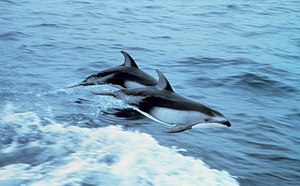The case for Dolphins as nonhuman persons...
 |
| Image via Wikipedia |
Loyola Marymount University
Are dolphins nonhuman persons? Loyola Marymount University professor Thomas White insists they are, and presented his research this week at the American Association for the Advancement of Science conference in San Diego.
White, the author of “In Defense of Dolphins: The New Frontier,” spoke on a panel on the “Ethical Implications of Dolphin Intelligence: Dolphins as Nonhuman Persons.”
He and other experts discussed scientific research showing dolphins are highly intelligent, and, like humans, appear to be self-conscious, unique individuals with personalities, memories and a sense of self. They are vulnerable to pain and suffering and experience fear, dread and grief, the research suggests.
“Dolphins should be considered nonhuman persons,” says White, “because they have the kind of consciousness that, in the past, we thought was unique to our species. They’re not just aware of the world around them but they have the ability to look inside and say ‘I.’ They have a sense of choice and will.’”
Because of these attributes, White believes, dolphins should be given “moral standing” as individuals. Humans have always believed that moral standing as an individual entitles them to special treatment. White says dolphins need to be treated in a similar way.
If that happens, certain human fishing practices would need to change, as would policies regarding the hundreds of captive dolphins used in entertainment facilities.
“Every year an estimated 300,000 dolphins die around the world, caught by commercial fishermen searching for tuna. Thousands more die in the annual Japanese drive hunts,” says White.
Are dolphins nonhuman persons? Loyola Marymount University professor Thomas White insists they are, and presented his research this week at the American Association for the Advancement of Science conference in San Diego.
White, the author of “In Defense of Dolphins: The New Frontier,” spoke on a panel on the “Ethical Implications of Dolphin Intelligence: Dolphins as Nonhuman Persons.”
He and other experts discussed scientific research showing dolphins are highly intelligent, and, like humans, appear to be self-conscious, unique individuals with personalities, memories and a sense of self. They are vulnerable to pain and suffering and experience fear, dread and grief, the research suggests.
“Dolphins should be considered nonhuman persons,” says White, “because they have the kind of consciousness that, in the past, we thought was unique to our species. They’re not just aware of the world around them but they have the ability to look inside and say ‘I.’ They have a sense of choice and will.’”
Because of these attributes, White believes, dolphins should be given “moral standing” as individuals. Humans have always believed that moral standing as an individual entitles them to special treatment. White says dolphins need to be treated in a similar way.
If that happens, certain human fishing practices would need to change, as would policies regarding the hundreds of captive dolphins used in entertainment facilities.
“Every year an estimated 300,000 dolphins die around the world, caught by commercial fishermen searching for tuna. Thousands more die in the annual Japanese drive hunts,” says White.















